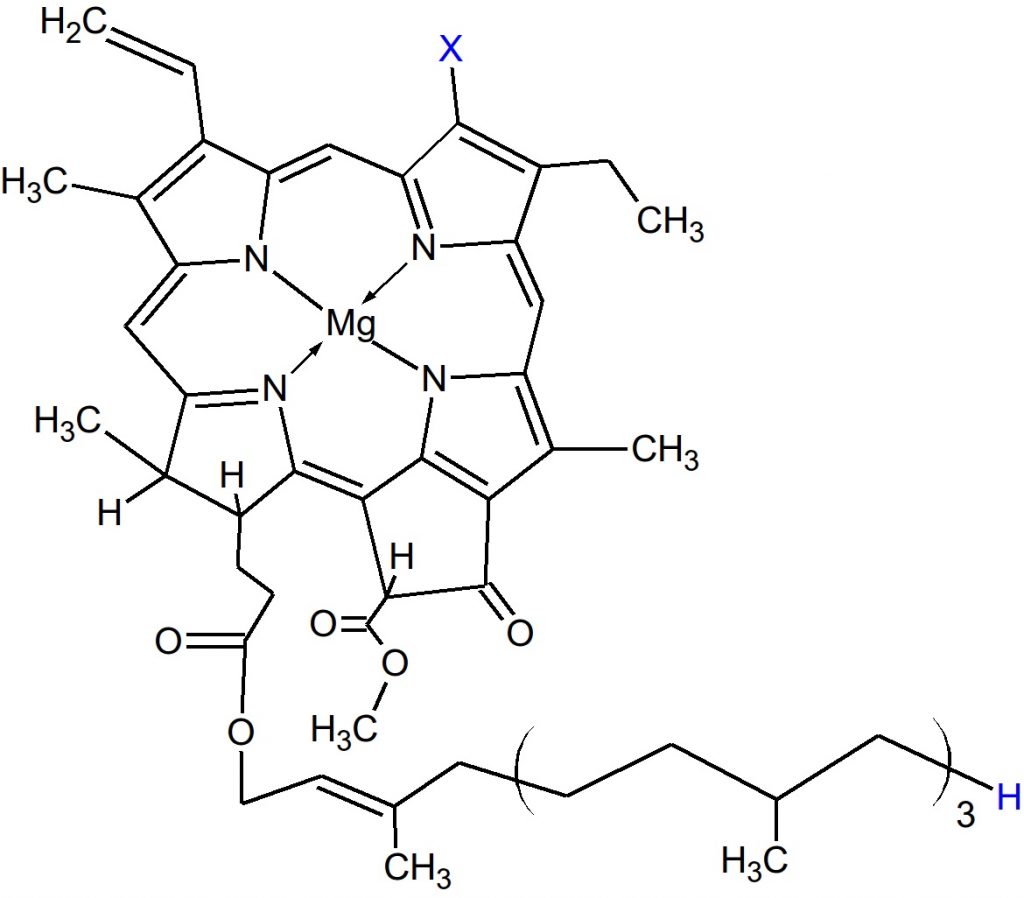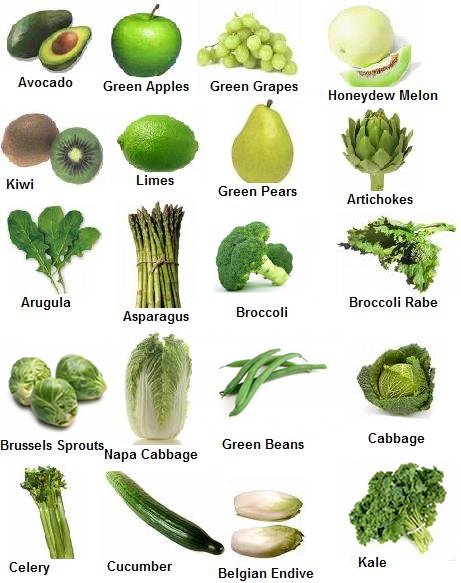Dr H Morrow Brown

| Potato can cause many allergic problems in any body System Everybody eats potatoes, which were brought to Europe from South America by the Spaniards over 500 years ago. Potato belongs to the botanical family Solanaceae, which includes tomato, aubergine, peppers, tobacco, deadly nightshade, and many others.Potato has quite often been considered such a bland food as to be included in diets for food intolerance, but I have found that a remarkable variety of serious problems were caused by potato in thirty-nine cases of all ages. Recent research in Finland has established that potato contains several powerful allergens. Definite allergy to potato is very rare, when being in the kitchen near potatoes being cooked may be enough to bring on a severe asthma. The only case I have seen as sensitive as this was diagnosed as having ‘whooping cough’ as a baby, but the cough persisted along with swelling of the lips, tongue and eyes.Mother finally made the diagnosis by observing that the attacks related to meals containing potato or being near cooking potato. With difficulty she convinced the doctors that if potato was strictly avoided her daughter would remain well. Even a trace of potato on a serving spoon was enough to trigger an attack of asthma, and tomato causes a lesser reaction.Slow reactions, which can cause all sorts of problems anywhere in the body, are not so uncommon, as I have collected thirty-nine cases over the years.. In housewives the commonest sign of a possible potato allergy is sneezing or wheezing when scraping new potatoes because this creates a fine spray of juice from the potato skin, or itching of the hands or worsening of eczema after peeling potatoes. Potato is such a common food that the possible significance of this observation is seldom realised. Pricking through a drop of fresh potato juice produced a very positive skin reaction in thirty two cases. Effects on Behaviour and Nervous System Potato affected behaviour in seven cases. The first case who alerted me to this possibility was a ten year old girl attending the clinic for seasonal and perennial hay fever, who also gave the impression of being mildly mentally retarded and very lethargic. She had frequent headaches, slept most of the day, and had no initiative whatsoever. Nine years later she was living away from home at college, cooking for herself, when a sudden shortage made potatoes so expensive that she did without them. Fortunately her clinic visit was at this time, when I was struck by the complete change in her personality. She was quite vivacious and lively, and she told me that that her headaches and lethargy had vanished overnight, after giving up potatoes. Three deliberate open challenges with potato reproduced headache and lethargy each time, and finally an accidental challenge, when she was unaware she had had potato, confirmed the association beyond doubt. This case heightened my awareness, but the presentations were variable and bizarre. The most striking cases are worth describing in detail because somebody may recognise a similarity with their own problems. The most dramatic case was a boy aged five who had had frightful behaviour since a baby followed by asthma since age three. Mother was blamed for his behaviour, but he also had thirst, bedwetting, and large smelly floating stools. She had observed that if he had a stomach upset and could not eat for a few days he suddenly became a lovable little boy, but his dreadful behaviour reappeared as soon as he began to eat again. The possible significance of this observation was dismissed out of hand by a professor of paediatrics, but mother demanded he be seen by an allergist. When I saw him he was almost impossible to examine, and a wide range of skin tests were negative. He had a distended stomach, very heavy shadows under his eyes, and severe asthma, so he was put on a diet consisting of only lamb and rice. All his problems vanished in a few days, and he became a lovely little boy who actually allowed me to take blood without complaint! At school he could sit still and concentrate for the very first time, as shown by dramatic improvement in writing and art work. Separate reintroductions of potato, milk, and wheat all reproduced his problems, suggesting he had wheat and milk intolerance as well as potato. He remained well on a restricted diet, but extensive blood tests were all negative for allergy, and for Coeliac disease.. To encourage him his parents also went on the restricted diet, and to everyone’s surprise father’s personality also improved, but when both father and son ate potato they both became nasty and aggressive. Further enquiry revealed that the only time when father ate potato chips was at lunch on Fridays, explaining why by the time he got home on Fridays he was always nasty and aggressive. Milk or cheese would also make both of them miserable and depressed, and the colic and diarrhoea of another sibling aged six months was found to be due to cows milk and wheat intolerance. Another little boy aged three and a half was described by his mother as having a Jekyll and Hyde personality, and also had severe eczema. After three days on a test diet of lamb and rice both eczema and misbehaviour disappeared. Test feeds showed repeatedly that potato, milk, and orange squash would reproduce tantrums and eczema and he was transformed from a stubborn, resentful, withdrawn, whining child to a normal happy little boy. Two other children with perennial rhinitis also had behavioural problems caused by potato. One aged sixteen, suffered uncontrollable emotional tantrums on exposure to tobacco smoke, drawing attention to tobacco belonging to the same botanical family. He also had learning difficulties which vanished on avoiding potato, and he rapidly ascended to the top of his class. Challenges with potato reproduced his symptoms every time, but eventually he could tolerate potato without problems. Some Mothers actually do have them! Andrew was thirty nine, and since. childhood he had had poor coordination, clumsiness falling over, dropping things, and bumping into things, with short attention span, mood swings and a stammer. His daughter aged eleven also had food and dye intolerances, mood swings, and poor coordination, which were sorted out at Great Ormond Street Hospital. Aged 27 he began to have diarrhoea which ceased on avoidance of gluten, and accidental or intentional consumption of gluten resulted in diarrhoea the next day for three days, and although a biopsy was negative the diagnosis was confirmed on clinical grounds. Aged 37 he began to experience episodes of tingling and swelling of lips and sometimes throat, and increased difficulties with coordination, and accident proneness. He had frequent headaches for which he took large numbers of Paracetamol tablets, and mood swings when he would tend to say the silly things to the wrong people in inappropriate situations. These episodes would occur several times a week at irregular intervals. Fish such as tuna or salmon would repeatedly cause him to fall asleep, and had to be avoided because of driving. He was advised to go on a ‘few foods’ diet, and a month later he reported many changes for the better. The results of deliberate or accidental ingestion of certain foods were remarkable, especially that when he had had eaten the wrong food his wife had noticed that “he walked with his toes turned out, like a duck” but there was no opportunity to show this on a video. Coordination and manual dexterity had improved markedly, as he could type on his computer much faster, and remember programmes as never before. He no longer fell over, dropped things, or bumped into things. His wife was instructed to begin to introduce foods one by one to find out precisely what to avoid. On review a year later it transpired that potato was the major problem, especially as gluten free breads usually contain potato flour. He also had a very strong craving for potato, and as he had to travel a great deal on motorways he would have an occasional snack. On six or seven occasions he succumbed to the craving and had a packet of potato crisps, and about six hours later he would have the reaction, which was depression, clumsiness, aggressiveness, and headache. He would also have difficulty in speaking, taking in information, writing, and memory. These effects would last for three days from a packet of crisps, terminated by an attack of diarrhoea. His wife observed that giving him potato concealed in soup caused lip swelling, joint pains, and visual difficulties for three days ending with acute diarrhoea, which presumably got rid of the last traces of potato.Tomato had a similar effect, and exposure to the smell of tomato plants in the conservatory would cause a reaction in the lips and throat in minutes. It was not possible to stop him smoking a pipe, so the effect of this is unknown. He had similar reactions to soya, which made his diet even more difficult, He gave a remarkable typed statement regarding the effects of potato, as follows:- “I feel good/high on top of the world. This lasts for two hours max. I have a headache, my lips tingle, my mood changes, I come aggressive, depressed, and my vision deteriorates. — devil may care attitude –hang consequences—I may take risks—this will last for about 2-3 days-my stomach swells up—frequent visits to the toilet- I get blotched hands- -it used to be once a week then 2 time a week and now it is all the time, my complexion goes, my writing goes funny, my vision goes blurred, I lose patience, my feet sweat more than normal and I am tired out. I get fed up with life in general, I get clumsy, hot, insecure, anxious,. I get an increased sense of smell and I wake up in the night and early morning.” After four years it was obvious that there were great difficulties with the diet, and with compliance because of the cravings. He was the only one of the series who smoked, in this case a pipe, but could not stop. It is unfortunate that this was not possible, in view of the effects of tobacco smoke on many potato sensitive patients. Potato Eczema Potato was the sole cause in five patients out of twenty-two with eczema. Two of them always began to itch when exposed to tobacco smoke The oldest was sixty-nine, had had eczema for 52 years. She came because she was worried about the effects of using steroid creams for thirty years, and had noticed that ‘doing the potatoes’ made the eczema worse. The remarkable improvement and healing after avoidance for eight months is illustrated in the section on eczema. Potato was an important factor in seventeen other eczematous patients aged from 18 months upwards. The possibility was often suggested by using fresh potato juice routinely for a prick testing. Enquiry regarding effects from handling or peeling potatoes sometimes suggested the diagnosis, because the potato juice gets into the skin through tiny cracks in the skin, thus performing a natural skin test. Other foods were also involved in seven cases, inhalant allergens such as dust mites and pets in six, and both foods and inhalants in four. These findings emphasise that a quick fix by simply avoiding potato is uncommon, because all causative factors have to be defined and avoided simultaneously. Proof by the effects of test feedings could only be clearly established when all the other causes were also avoided. Potato as a cause of Eczema Edith was delightful lady of sixty-nine who had had eczema for 52 years. She had been using steroid creams daily for thirty years, and was worried because her skin had become very fragile and thin, and bruised very easily. Even the tips of her shirt collar rubbing on her neck was enough to cause bruising of the skin. |
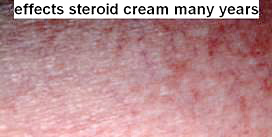
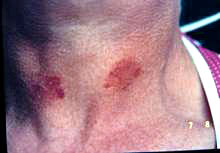

Six Months no potato
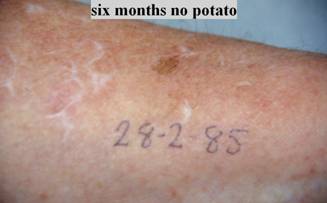
Appearance of forearm skin After no potato for six months
The only clue was that she had observed that she could not peel or handle potatoes because of the irritation and itching of the hands which they caused, so she was instructed to avoid potatoes and tomatoes completely. She soon stopped the steroid creams as the itch had ceased, and by six months her skin was as shown looking healthy and showing the scars of healed scratches on the forearm. The extent of healing at her age after the cause of the problem had been removed was surprising after half a century of eczema and thirty years of steroid creams.
Eczema caused by Milk, Potato, Tomato, Tobacco Smoke, and Citrus fruits
Moira was twenty-three when she developed a widespread itchy rash which was so severe that she was literally clawing herself to pieces. A dermatologist failed to find a cause and he suspected scabies or that she was inflicting this on herself, so her GP referred her for allergy investigation. When seen her condition resembled a very similar case who had been referred by a dermatologist to a psychiatrist who then referred her to me, and her eczema cleared completely after avoidance of milk.. Here are the photographs of this second case at her first visit.
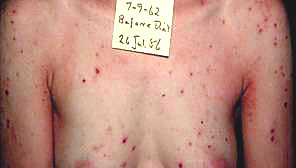
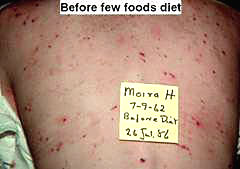

The first clue in this case was that her father had had very severe asthma which was found to be entirely due to milk, and that she herself had always disliked milk, so milk was excluded from her diet with some improvement by three weeks,. Milk having been excluded with benefit, she discovered that she would scratch all night if she ate potato, and that tomato had the same effect. Another member of the nightshade family, the Solanaceae, is tobacco, and she had repeatedly noticed that if she was exposed to a smoky pub she would itch severely after about fifteen minutes, and it stopped when she got out and went home where nobody smoked. She also discovered that traces of milk in bread, beef, rice, citrus fruit, and apples all caused itching.
Three months later she had improved remarkably with avoidance of these foods, as shown below.
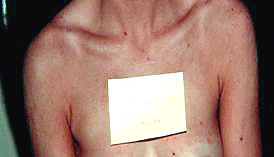
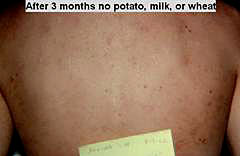
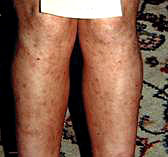
After six months on a restricted diet she had completely cleared as shown below, and remained well on a restricted diet. Nowadays she can risk an occasional dietary indiscretion, but still has to be very careful, particularly with milk products.
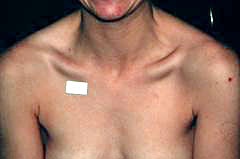
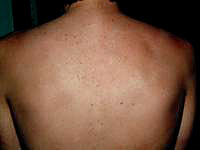
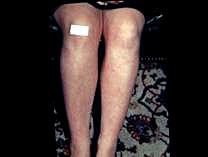
The clue to tobacco sensitivity was that a smoky pub caused severe itching, but avoidance of milk and milk products including beef, citrus fruits, tomato and potato was necessary to bring about complete clearance. She is now aged forty-six, but still has to avoid these foods completely.
MigraineA farmer’s wife aged seventy recently sought advice regarding migraine headaches several times a week for the last fifty years. The clue was that she had a definite craving for potato, and that tomato seemed to cause a headache next day. She has had no headaches since except when provoked by deliberately taking potato or tomato. It seems unfortunate that she had to wait fifty years for the answer!
Another lady aged fifty who had known allergies to antibiotics insisted on an allergy investigation, and was referred with a letter from her GP stating ”I am not really sure what she is hoping to achieve out of her consultation with you”
Her mother had eczema, her brother asthma and eczema, her son had had eczema, and a grandchild asthma. She had had projectile vomiting as a baby and was reared on semolina. She was a wheezy child but grew out of it, and was healthy until a few years ago. With such a family history it would have been surprising had her problems not been caused by allergy or intolerance.
Her complaint was of attacks of burning and intense itching which began on the arms then spread to legs and the rest of the body. Attacks usually came on after the evening meal and were so severe that she was suspected of having scabies. Three years previously she had noticed that a similar problem was triggered by orange juice or red wine, and she had a definite craving for potato.Violent sneezing attacks were triggered by air fresheners and the smell of washing powders in supermarkets even when she was unaware that she was near them. Tobacco smoke provoked wheezing, sneezing, and itching all over after about twenty minutes exposure in a pub.
All skin tests were negative, but with avoidance of milk, potato, tomato, citrus fruit, and tobacco smoke she became completely free from all symptoms except when accidentally exposed.Eating a small amount of potato or a tomato would reliably reproduce all the symptoms after twelve hours. The vital clue was her itchy reaction to tobacco smoke.
Miscellaneous Effects
One patient with surgically confirmed Crohn’s Disease experienced complete relief with avoidance and suffered no relapse when drug treatment was stopped. Eating potato skins, but not boiled potato, repeatedly caused colic and diarrhoea, and she has remained well by avoidance..
Two patients with chronic joint pain and swelling were completely better on avoidance, and test feeds repeatedly caused a relapse. Another patient who had had allergic rhinitis for twenty years which made her life a misery also cleared completely except when exposed to smoke.
World-wide response to Article about Potato Allergy on the Internet
Because potato is so seldom considered as a possible cause of illness nobody knows how many people are being made ill by potato and other members of this botanical family. After this article on the problems which potato can cause was published on the internet I received emails from all over the world from people who had discovered that potato was causing a variety of problems.
The furthest email was from the Australian outback from a rancher who had found that all his serious emotional problems were being caused by potato. Another acute allergy was in a farmer’s wife who was raising potatoes in Idaho, a State in the USA renowned for growing potatoes. A little girl had a passion for red tomatoes which caused eczema, but not green ones. When she got the chance to indulge in tomato sauce, eczema would appear in two hours. Another reported that she felt wonderful avoiding potato, but eating a few would bring on acute depression and weeping.A medical student had a persistent severe itch for years for which she was taking antihistamines which made her sleepy so that study was an effort. She told me that tomatoes caused immediate diarrhoea, which suggested that she could be allergic to potato, although all skin and blood tests were negative. The itch went after 36 hours of stopping potato, she has no need for antihistamine tablets, feels much brighter and can concentrate better. Her immunological tests were all negative, but eating a potato brings back the itch, so there is no satisfactory scientific proof of the diagnosis.
Another response from Pennsylvania USA is of great interest, and demonstrates how an intelligent patient can sort out her problems in spite of failure by all the experts. Christine had chronic sinusitis, rhinitis, and depression from age 11, but no family history of allergy. She is now aged 35, happily married with three boys who are all allergics in one way or another. She was well apart from her nasal problems until age 30, when she began to have severe colicky pains, aching joints, and very severe diarrhoea (25+ visits per day). Her nasal symptoms also got worse, she became allergic to aspirin and similar drugs, and developed nasal polyps. A facial rash and mouth ulcers also appeared, and she was very depressed and lethargic..
In hospital she was tested for all manner of possible diseases, and finally diagnosed as Crohn’s Disease for which she was ineffectually treated for two years. At this point about six months ago further investigation of her bowel revealed that she did not have Crohn’s, but had a polyp, which was removed, and a gross overgrowth of yeast in the gut, possibly as a sequel to having had a great deal of antibiotics.
Christine was given a course of Diflucan, a very effective antifungal drug, which was helpful, took some probiotics, and she decided “to give up on the doctors”. She began to suspect a food allergy, and in spite of this idea being dismissed out of hand by all her specialist medical advisers, began to keep a food diary. She noticed that she had no colicky pains or diarrhoea on nights when she cooked rice or ate pizza, and had no potato, which she had eaten nearly every night since childhood. Although she felt very sceptical she decided to stop potato, and in a day or so all her troubles vanished. She was a heavy smoker but quit a month ago, which may also have helped. She is now well, but has discovered that Doritos and Pringles, ( which she did not know contain potato), and also oatmeal, will also set off pains and diarrhoea, but she can tolerate white bread. Christine hopes she will continue to be able to avoid doctors !!
When should you suspect that Potato might be the Cause of your Problem?
True allergy to potato is very rare, and. the rapidity of reaction will direct attention to the cause, so that the sufferer should take great care to avoid potato and other members of this botanical family. The range of effects of potato I have seen is so wide that it might be worth while avoiding potato, tomato, peppers, tobacco smoke, (and probably smoking, snuff, or chewing tobacco if the subject is addicted to tobacco ), for a week or two to see if the problem, whatever it may be, will be relieved.It is remarkable that I have never found any effects which could be associated with smoking in potato sensitive patients, but I have seen cases where their allergy problems began when they stopped smoking, and this has been reported by others.
The diagnosis depends entirely on awareness of the existence of potato intolerance, and that almost any symptom can be caused by the Solanaceae. There is no diagnostic test except avoidance followed by repeated challenges. A positive skin prick test with fresh potato juice is suggestive, but there are no convenient scientific tests available and little chance that the diagnosis could be made during a short NHS consultation.
It is now proven and accepted that smoking tobacco causes cardiac problems as well as cancer. I remember that many years ago an allergist called Joseph Harkavy presented impressive objective evidence at every meeting of the American College of Allergy that tobacco caused allergic disease of the coronary arteries – but nobody would take his findings seriously! Perhaps his evidence should be re-examined today

